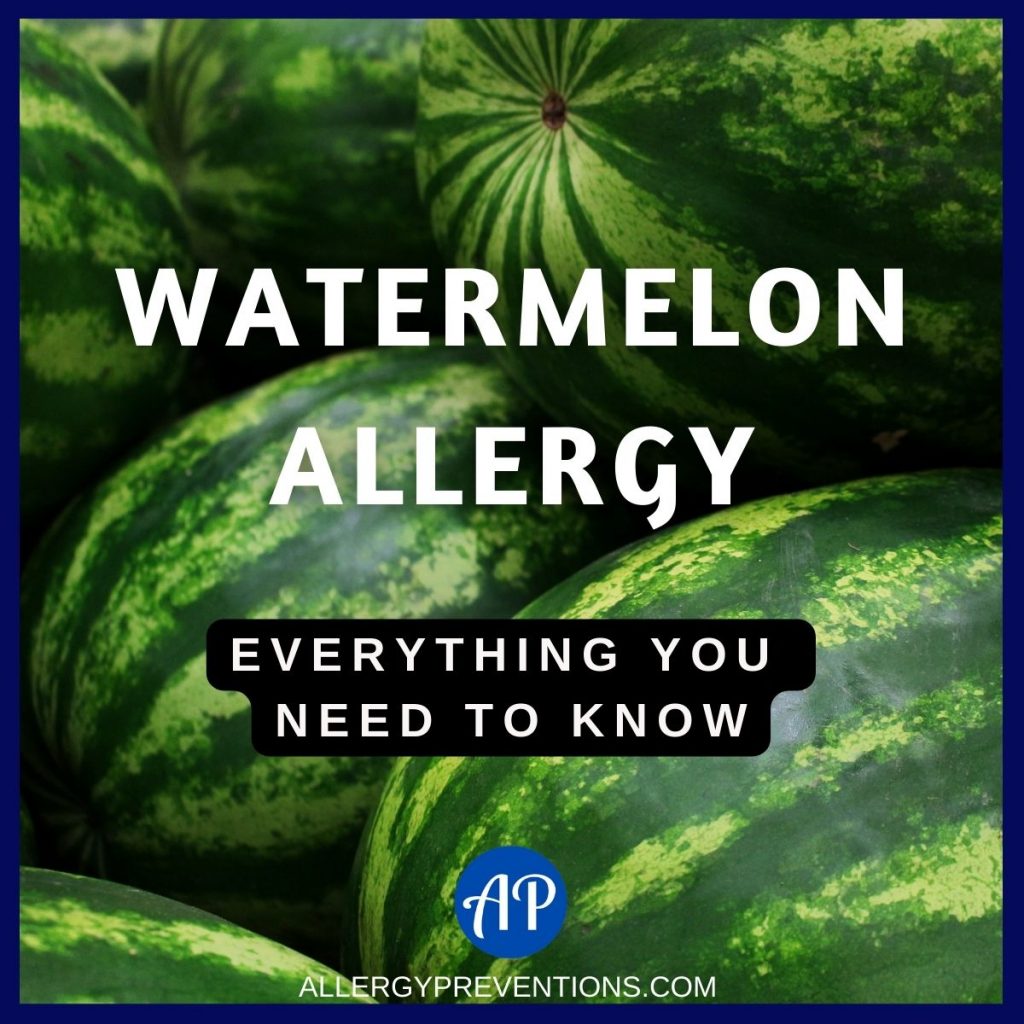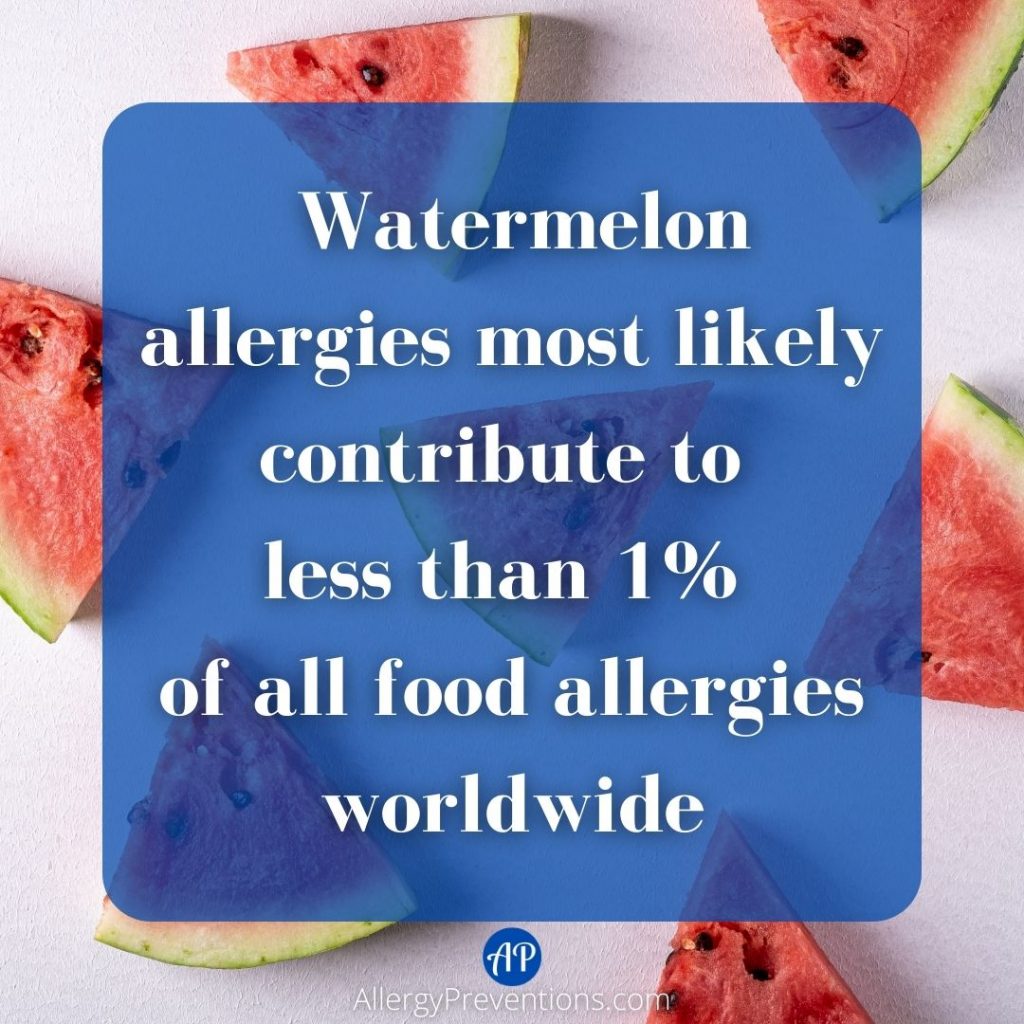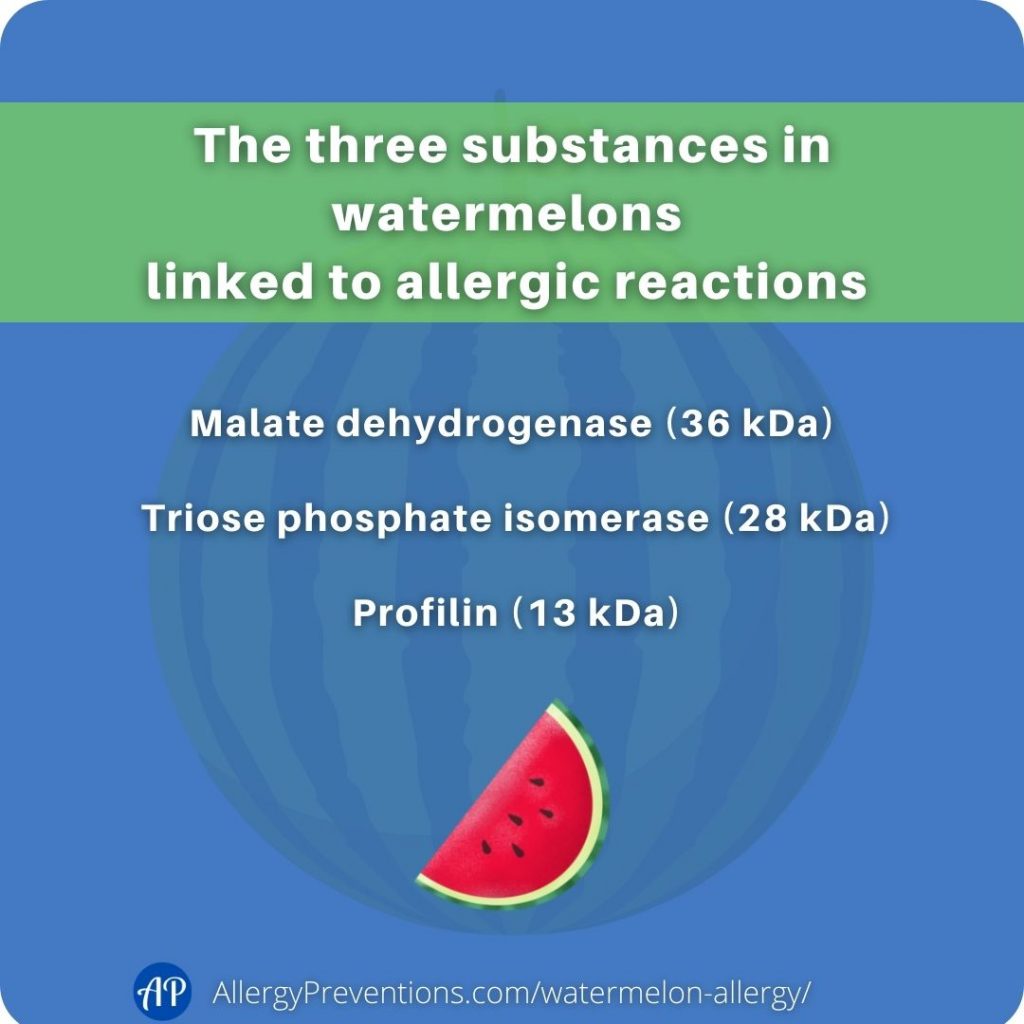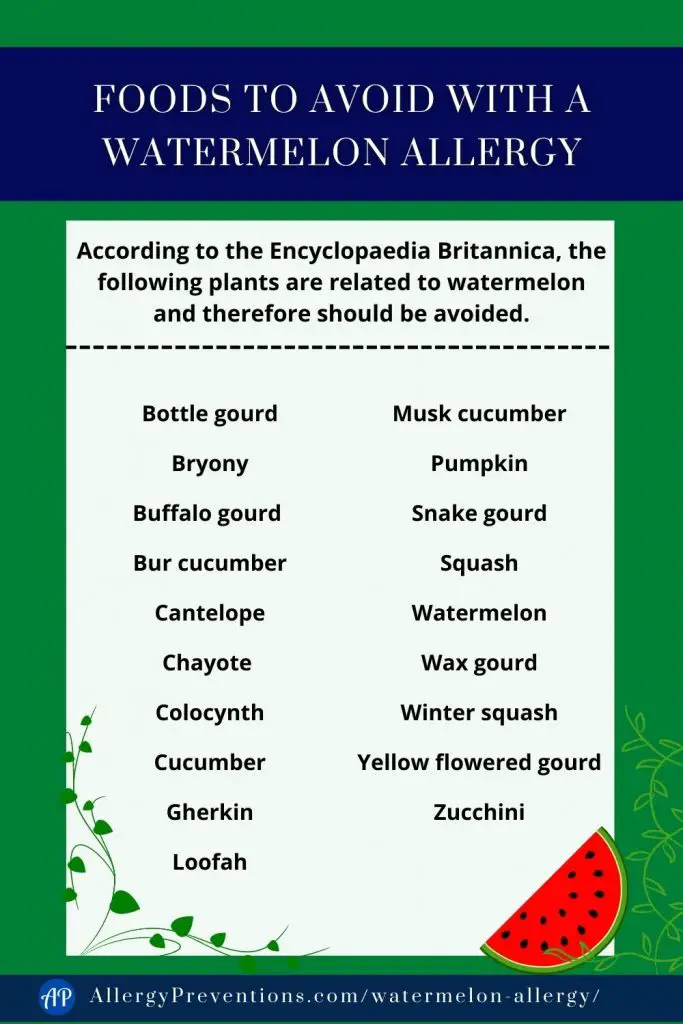If you suffer from a watermelon allergy or think you may have a watermelon allergy, then this guide is for you. Here we will cover everything you need to know about watermelon allergies, from the symptoms to the causes, and how to prevent them.
We’ll also discuss treatment options and foods to avoid. So whether you’re newly diagnosed, just curious, or have been living with watermelon allergies for years, this guide has something for everyone.

Can you be allergic to watermelon?
Yes, watermelon allergies are possible but very rare. Scientists have identified three major allergens that contribute to a watermelon allergy.
The allergens identified were:
- Malate dehydrogenase (36 kDa)
- Triose phosphate isomerase (28 kDa)
- Profilin (13 kDa)
If you think you may be allergic to watermelon, see an allergist or doctor for diagnosis and treatment.
What is a watermelon allergy?
A watermelon allergy is a reaction that occurs when the body’s immune system mistakenly identifies proteins in the fruit as dangerous invaders. When a watermelon allergy sufferer eats watermelon, their immune system releases histamines in response to the perceived threat. These histamines can cause a range of symptoms, from mild discomfort to a potentially life-threatening allergic reaction.
How common is a watermelon allergy?

Watermelon allergies are very rare, and most likely contribute to less than 1% of food allergies worldwide. According to worldallergy.org, scientists agree (mostly) that food allergies affect 2.5% of the population worldwide. The 2.5% is mostly comprised of the “Big 8 Allergens“. If you think you may be allergic to watermelon, it’s important to see an allergist for diagnosis and treatment.
Can you develop an allergy to watermelon?
Yes, you can develop a watermelon allergy at any time, for any reason. Some people are born with watermelon allergies, while others may develop one later in life. No one knows exactly why some people develop food allergies, while others don’t, but it’s thought that a combination of genes and environment may play a role.
Is watermelon a high allergy food?
No, watermelon is not considered a high allergy food. While watermelon allergies are rare and tend to not have as severe side effects as you would see with peanut or shellfish allergies. Most (not all) sufferers can eat some watermelon or melon without experiencing any severe reactions. However, if you are allergic to watermelon, it’s important to avoid eating it and any other foods that may contain watermelon ingredients.
Symptoms of a watermelon allergy
The symptoms of a watermelon allergy can vary from person to person, some common symptoms include:
- Chest pain
- Difficulty breathing
- Dizziness or lightheaded
- Hives
- Itching
- Nausea or vomiting
- Rash
- Stomach pain
- Swelling of the lips, tongue, or throat (OAS)
Anaphylaxis, a potentially life-threatening allergic reaction, can occur within minutes of exposure and requires immediate treatment. If you experience any of these symptoms after eating watermelon, it’s important to seek medical help right away.
Watermelon skin rash
Watermelon can cause skin allergies also known as contact dermatitis. Contact dermatitis is a type of skin irritation or rash that is caused by physical contact with certain substances. For people with a watermelon allergy, contact dermatitis may be caused by exposure to substances from the fruit like juice, seeds, or rinds.
The most common symptoms of a contact dermatitis watermelon allergy are hives, rash, and itching. If you experience these symptoms after coming in contact with watermelon, see a doctor for diagnosis and treatment.
What causes a watermelon allergy?

The substances that cause an allergic reaction for people with watermelon allergies are malate dehydrogenase (36 kDa), triose phosphate isomerase (28 kDa), and profilin (13 kDa). The causes of watermelon allergies (or any allergies) in the body are not yet fully understood, but scientists believe that a combination of environmental and genetic factors may be responsible.
Preventing watermelon allergies
There is no known way to prevent your body from having watermelon allergies, but there are steps you can take to reduce your risk of an allergic reaction.
Tips for preventing watermelon allergy reactions include:
- Avoiding contact with watermelon proteins
- Avoiding consumption of watermelon
- Avoiding foods from the gourd family
- Reading food labels ( watermelon juice, seeds, rinds)
Foods to avoid with a watermelon allergy

If you are allergic to watermelon you should avoid all fruits and vegetables that come from the “Cucurbitaceae” gourd family. According to the Encyclopaedia Britannica, the following plants are related to watermelon and therefore should be avoided.
- Bottle gourd
- Bryony
- Buffalo gourd (calabazilla)
- Bur cucumber
- Cantelope (C. melo)
- Chayote (mirliton, choko)
- Colocynth
- Cucumber
- Gherkin
- Loofah
- Musk cucumber
- Pumpkin
- Snake gourd
- Squash
- Watermelon
- Wax gourd
- Winter squash
- Yellow flowered gourd
- Zucchini
Testing
If you think you may have a watermelon allergy, the best thing to do is to see an allergist. Allergists are specially trained to diagnose and treat allergies. An allergist can perform a skin prick test, blood test, or food challenge to determine if you are allergic. Once your allergy is confirmed, the allergist will work with you to create a treatment plan.
Skin prick test
A skin prick test is a common way to diagnose food allergies, including watermelon. During this test, a small amount of watermelon extract is placed on the skin and then pricked with a needle. If you are allergic to watermelon, you will develop a red, itchy rash at the site of the prick.
Blood test
A blood test can also be used to diagnose watermelon allergies. This test measures the levels of watermelon-specific antibodies in your blood. If you are allergic to watermelon, your blood will contain high levels of these antibodies.
Food challenge
In some cases, an allergist may perform a food challenge to confirm a watermelon allergy. This test is usually done in a hospital or clinic setting. During the test, you will be given small amounts of watermelon to eat, and the allergist will then monitor you for signs and symptoms of an allergic reaction. A food challenge is considered the gold standard for diagnosing food allergies.
Additionally, your doctor or allergist may want you to keep a food diary. A food diary will help them identify patterns between what you are eating and your symptoms.
Watermelon allergy FAQs
What is in watermelon that you can be allergic to?
The substances that cause an allergic reaction for people with watermelon allergies are malate dehydrogenase, triose phosphate isomerase, and profilin.
What is a watermelon protein?
A watermelon protein is a water-soluble protein that is found in watermelons. These proteins are responsible for the fruit’s flavor, color, and sweetness.
How common is watermelon allergy?
A watermelon allergy is considered rare. It is estimated that less than 1% of the population has a watermelon allergy.
How can someone be allergic to watermelon?
The exact cause of a watermelon allergy is unknown. Someone who is allergic to watermelon has an immune system that is overreactive to one of the 3 main watermelon allergens.
Can you develop an allergy to watermelon?
Yes, regardless of age, gender, or ethnicity you can develop an allergy to watermelon.
Can humans be allergic to watermelon?
Yes, humans can be allergic to watermelon.
Final thoughts
There is everything you need to know about watermelon allergies! What has been your experience with watermelon allergies? If you would like to share, send me an email: Chris@allergypreventions.com
Check out these food allergy articles too!

